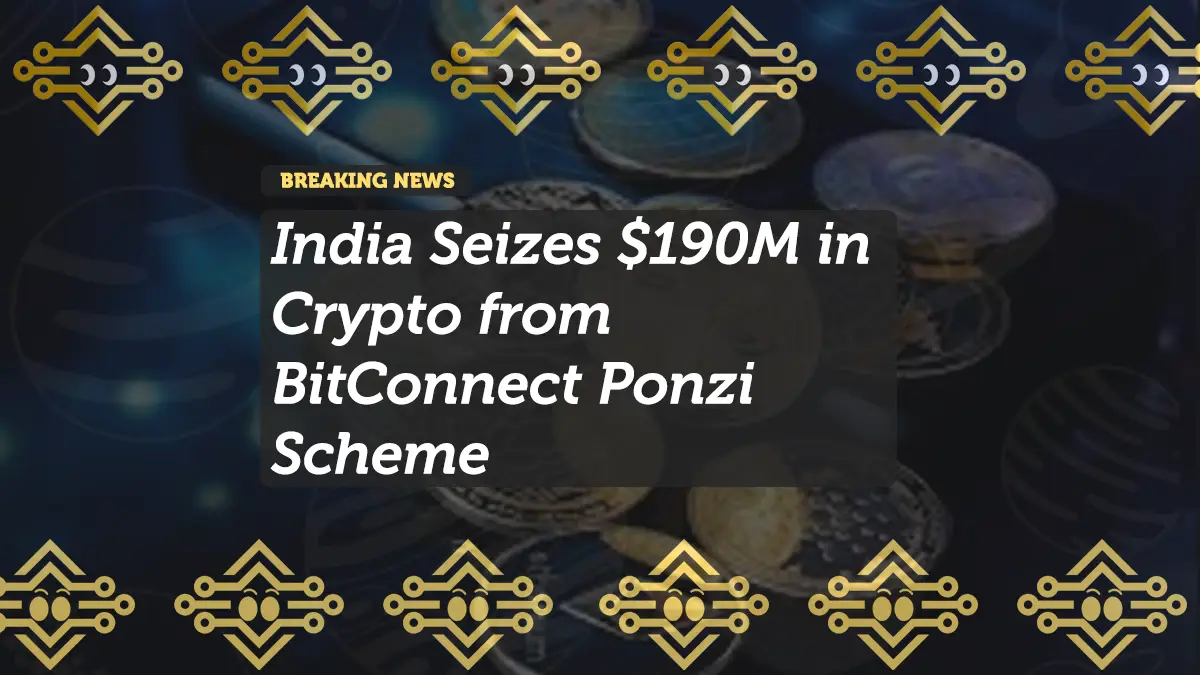
India Seizes $190M in Crypto from BitConnect Ponzi Scheme
Indian authorities have taken one of the largest crypto enforcement actions to date, seizing $190 million worth of digital assets linked to the infamous BitConnect Ponzi scheme. This crackdown reinforces India’s tough stance on crypto fraud and raises important questions about future regulations.
Here’s what happened and what it means for the crypto industry.
1. What Was BitConnect? A Look at the Infamous Ponzi Scheme
BitConnect’s Operations (2016-2018)
BitConnect was a cryptocurrency investment platform that lured investors with promises of 40% monthly returns. It claimed to have an automated trading bot that profited from Bitcoin price volatility.
How It Worked:
✅ Investors deposited Bitcoin in exchange for BitConnect (BCC) tokens.
✅ They were promised high daily returns through an alleged “volatility software trading bot.”
✅ In reality, returns were paid using new investors’ funds—a classic Ponzi scheme model.
At its peak, BitConnect’s market cap reached $2.5 billion, before collapsing in January 2018, causing thousands of investors worldwide to lose their funds.
2. Details of India’s $190 Million Crypto Seizure
What Was Seized?
$190 million in cryptocurrencies
$15,570 in cash
Luxury Lexus SUV
Electronic devices linked to crypto transactions
Who Conducted the Seizure?
The Enforcement Directorate (ED), India’s financial crime investigation agency, conducted multiple raids in Ahmedabad, Gujarat on February 11 and 15, 2025.
Legal Basis
This action was taken under the Prevention of Money-Laundering Act (PMLA), 2002, following multiple First Information Reports (FIRs) filed by India’s Crime Investigation Department (CID) in Surat.
3. Who Was Behind BitConnect? The Key Players
Satish Kumbhani (BitConnect Founder & Fugitive)
Kumbhani, an Indian national, launched BitConnect and recruited international promoters to attract investors.
He disappeared in 2018 after the scheme collapsed.
Indian and U.S. authorities have issued a global warrant for his arrest.
Glenn Arcaro (BitConnect U.S. Promoter)
Pleaded guilty to fraud charges in the U.S. in 2021.
Ordered to forfeit $24 million in illegal earnings.
4. India’s Regulatory Response: Crypto Crackdown or Balanced Regulation?
This seizure is part of India’s broader regulatory efforts to prevent financial fraud in the crypto space.
India’s Stance on Cryptocurrency
❌ Harsh taxation – India introduced a 30% tax on crypto profits and 1% TDS on all crypto transactions in 2022.
❌ No clear regulations – Despite multiple calls for a regulatory framework, crypto remains in a legal gray area.
Regulation vs. Ban – While some government officials push for strict regulations, others favor outright banning cryptocurrencies.
Will This Case Influence Future Crypto Policies?
✅ Stronger Oversight – More scrutiny over crypto platforms and transactions.
✅ Investor Protection Measures – India might introduce stricter anti-fraud policies for crypto exchanges and projects.
✅ Global Cooperation – Enhanced coordination with U.S. and European regulators in tackling crypto-related financial crimes.
5. What Happens Next?
Ongoing Investigations
Authorities continue to trace more crypto-linked assets from BitConnect.
Restitution efforts – Authorities are exploring ways to recover stolen funds for affected investors.
International Law Enforcement – India is working with Interpol and U.S. officials to locate and arrest Kumbhani.
Market Impact
Investor Caution – Cases like this reinforce crypto’s association with high-risk investments in India.
Calls for Regulation – Crypto proponents argue that clear regulations would help prevent such scams in the future.
6. Key Takeaways from India’s Crypto Seizure
✅ India seized $190M in crypto tied to the BitConnect Ponzi scheme—one of the largest busts to date.
✅ Founder Satish Kumbhani remains at large, with international efforts underway to locate him.
✅ India’s crackdown signals stronger regulatory actions against illicit crypto activities.
✅ The case could influence India’s crypto regulations, potentially leading to tighter oversight or even a legal framework for digital assets.
Final Thoughts: Is Crypto Regulation in India Inevitable?
India’s seizure of BitConnect’s assets is a warning to fraudulent crypto schemes and a reminder of the risks unregulated crypto projects pose to investors.
While some fear that India’s approach could hinder innovation, others argue that better regulations will prevent scams while allowing legitimate crypto businesses to thrive.
What do you think? Should India regulate or ban cryptocurrencies? Share your thoughts below!










